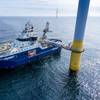Public Ports Push For Federal Funding Of Deep Draft Navigation
U.S. public port officials testified Wednesday, Nov. 3, at a hearing before the House Transportation and Infrastructure Subcommittee on Water Resources and Environment about the continued need for federal government investment in maintaining harbors around the country to ensure that the U.S. maintains a modern, efficient and safe marine transportation system.
Testifying on behalf of the American Association of Port Authorities (AAPA), Lillian Borrone, Director, Port Commerce Department, The Port Authority of New York and New Jersey, said that "the health of our nation's ports depends on the strong and long-standing partnership between local public port authorities and the federal government."
According to the U.S. Maritime Administration, in 1998 alone, ports invested nearly $1.5 billion in updating and improving their facilities; an additional $9.1 billion of non-federal investment is expected before 2002.
The federal government has historically funded 100 percent of navigation channel improvements as well as maintenance, but in 1986 the federal role of the partnership was limited to cost-sharing capital improvements to federal navigation channels. Today, federal spending for maintenance dredging of navigation channels is about $500 million from the Harbor Maintenance Tax.
A recent General Accounting Office study shows that the commercial maritime industry pays $22 billion per year in federal assessments.
Ms. Borrone talked about the need to strengthen the federal participation in funding harbor development and maintenance, including support for H.R. 1260, the "Support for Harbor Investment Program," or "SHIP Act," as introduced last spring by Representatives Borski (D-PA) and Oberstar (D-MN). H.R. 1260 would repeal the Harbor Maintenance Tax and use existing general revenues for funding costs of operating and maintaining federal navigation channels.
U.S. public ports also support H.R. 111, "The Truth in Budgeting Act," which would take the Harbor Maintenance Trust Fund and other trust funds off budget. This legislation would ensure that the money in the trust funds could be used only for its intended purpose and not be used to provide bookkeeping offsets to deficits elsewhere in the federal budget.
Ms. Borrone went on to say that regular enactment of the Water Resources Development Act (WRDA) legislation, which authorizes harbor improvements, is of critical importance to the nation's economy. "The task of meeting the present and expected future demands on our navigation system has never been so complex, and never as much in the public spotlight, as it is today," she testified. If projects are not authorized regularly, the national benefits, as well as regional economic diversification and job creation opportunities, will be delayed or lost.
The AAPA testimony also noted the need to accommodate the new classes of Post-Panamax ships, which can load more cargo per vessel, some more than 4,000 TEU, but also require deeper drafts. The required depth for general cargo navigation channels may be as great as 53 ft.
In WRDA '86, Congress created a cost-sharing formula for navigation improvement projects based on the needs of the general cargo fleet at that time. A cost-sharing transition was set at 45 ft., above which (i.e. shallower) local sponsors (generally the port) would pay a 35 percent (25 percent plus 10 percent over 30 years) cost-share and below which (i.e. deeper) would be cost-shared at 60 percent (50 percent plus 10 percent over 30 years) local.
AAPA believes that Congress should revise the cost-sharing formula to adjust the upper cost-sharing threshold to reflect the changes that have occurred in the general cargo fleet.
Other witnesses at the hearing included John H. Anderson, Jr., Director of Transportation Issues, General Accounting Office; David R. Conrad, Water Resources Specialist, National Wildlife Federation; a representative of the Associated General Contractors of America; William N. Whitlock, Chairman, Inland Waterways Users Board; Barry Palmer, Executive Director, DINAMO; Christopher J. Brescia, President, MARC 2000; J. Stephen Lucas, Vice President, Louis Dreyfus Corp.; and Timothy D. Searchinger, Senior Attorney, Environmental Defense Fund.
Sponsored Content
Experience Custom Yacht Signs and Designs Tailored to Perfection!

April 2025
 Read the Magazine
Read the Magazine

 Read the Magazine
Read the Magazine
This issue sponsored by:

Saltchuk Doubles Down on Workforce Development Investments
Subscribe for
Maritime Reporter E-News
Maritime Reporter E-News is the maritime industry's largest circulation and most authoritative ENews Service, delivered to your Email five times per week








